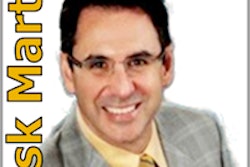Editor's note: The Coaches Corner column appears regularly on the DrBicuspid.com advice and opinion page, Second Opinion
The ability to handle conflict in a meaningful way is one of the most important determinants of success in life.
As a person who shied away from conflict the majority of my life, it took me a long time to know different.
As a professional coach, I see the many choices doctors, staff members, and patients make around conflict, and the results of these choices.
So, what's so magical about conflict?
The ability to develop and maintain more meaningful relationships -- whether at home, work, or in the community -- lies in our ability to turn conflict into a better understanding of the other person or organization. But doing that -- and doing it well -- is perhaps a tall order!
As our world, practices, and lives become more complex, conflict is playing a greater role than ever before. Thus, learning how to deal with conflicts effectively is increasingly an essential life skill needed by every person and every group, regardless of one's age, social role, profession, cultural background, or beliefs.
Each of us has our own ideas, opinions, and needs, and how we deal with our differences with others can determine our quality of life.
Let's take some simple examples we all know from a dental setting. I will give you the situation and the choices for resolving the situation. Make a note of your response for each situation.
Situation 1: Susan has just been hired as your new chairside assistant. She's had a lot of experience, and you have high hopes that her experience and enthusiasm will spur your existing team members on.
The first two weeks go pretty smoothly, but by the end of the third week, another assistant in your practice comes to you at the end of the day wanting to talk. She's upset that Susan is not pulling her weight, and she's irritated that Susan is always asking her where everything is. Further, the rest of the staff seems to be getting agitated, too. You've noticed that normally everyone eats lunch together, but lately everyone has been dispersing at lunchtime.
What would you do?
- Tell your assistant not to worry about it; she's just new and is trying to figure out her place in the practice.
- Suggest to your assistant that she go work it out with Susan; you're too busy for things like this, and she should be able to work it out.
- Go to Susan and tell her that you need her to be more involved in the practice, and for that, you'll increase her pay by 10%.
- Tell your assistant you'll hire another assistant to help with the workload.
- Explain to your assistant that we're all a team and she needs to quit complaining; she has a job to do, and by not helping out, she's a part of the problem.
Situation 2: Amy has been a hygienist in your practice for over a decade. She's a steady performer, but the past several months she seems to be just going through the motions of everyday work. You've noticed her production has been dropping, and when you ask her about it, she says, "It's just been the mix of patients who've come in lately." You know better, because she's never been underperforming for this length of time.
What would you do?
- Meet with Amy again and tell her that if her production doesn't return to a certain level, that you will have to cut her hours.
- Talk to the front office and tell them to make sure Amy's schedule stays booked.
- Make a deal with Amy: she brings her production back up, and you'll increase her compensation by another 5%.
- You've already met with her once, so she understands you're paying attention to her performance. Just let things ride for another few months.
- Start interviewing for a new hygienist; that will get her attention!
Make your choice for each situation, and email me at [email protected]. I'll be sure to respond with feedback.
Don Deems, D.D.S., F.A.G.D., known as the Dentist's Coach, is a co-founder of the Dental Coaches Association, an organization of dentists who are professional coaches committed to bringing professional coaching to the dental profession. Learn more about professional coaching by visiting http://www.dentalcoachesassociation.org/.
The comments and observations expressed herein do not necessarily reflect the opinions of DrBicuspid.com, nor should they be construed as an endorsement or admonishment of any particular idea, vendor, or organization.
Copyright © 2009 DrBicuspid.com



















